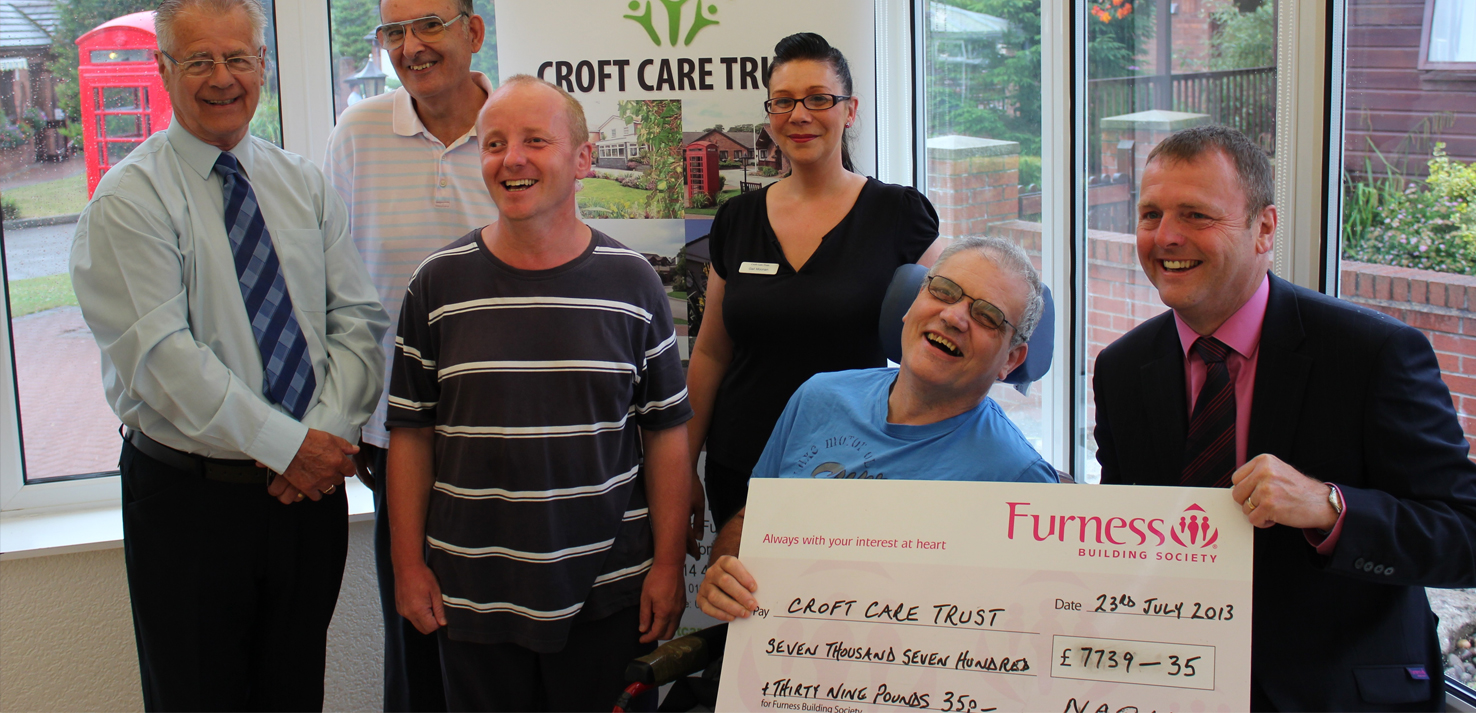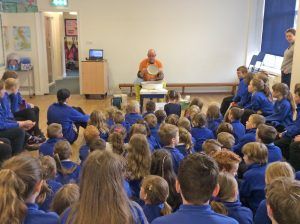Category: Grant Stories
Tackling tension around immigration in Barrow
Barrow is one of the most socio-economically deprived areas in Cumbria. It’s also home to a growing community of refugees and asylum seekers – like the rest of the UK, migration to Barrow has increased following the removal of restrictions introduced during the COVID-19 pandemic to limit travel and movement.
Many migrants relocate to the UK fleeing serious threat to their lives. They often arrive with no support networks and only limited English.
Believing access to essential services, housing and support for locals was restricted through the arrival of asylum seekers and refugees, Barrow was targeted by far-right individuals and groups sowing mistrust and intolerance in the community.
Cumbria Development Education Centre (CDEC) is a charity that unites people of all backgrounds and experiences in Cumbria, educating schools, communities and organisations on key social and environmental issues to empower locals to influence positive change.
Director Laura Goad says: “There was a growing ‘them and us’ attitude in Barrow. We had conversations with very concerned police officers, and headteachers were desperate for more help to support children from immigrant families.
“Refugees and asylum seekers were even at risk of verbal and physical abuse. It was time to act and funding from the Foundation meant we were able to provide our community with the expert, tailored support needed.”
“We put together a programme of special workshops, designed directly with refugees and asylum seekers and delivered by our expert team of educators. These took place both face-to-face in Barrow and online, ensuring we were able to maximise our reach. Our aim was to help people in key educational roles, including teachers, youth workers and parents, to build their knowledge on the most pressing issues.
“We also focused on helping children build empathy. Through immersive sessions with young people, we developed their understanding of the cultures and countries migrant children have relocated from. We also presented real-life stories from the people affected, helping children step into the shoes of refugees and asylum seekers.”
“Our work has helped parents and teachers increase their understanding around immigration and built their confidence to address racial and social injustices. They say they feel much better equipped to support children in need and tackle challenges like right-wing rhetoric. The sessions we held with pupils also had a big impact. Parents have told us about children continuing to talk about what they’ve learnt at home, long after the sessions have finished.”
“For the refugees we’ve been working with, this project has given them a voice. A voice to talk about who they are, and their life experiences that have brought them to Cumbria.”
There’s more work to do, but the community feels empowered to make positive change.
“Attitudes to immigration are always changing, so our work isn’t done. But thanks to funding from Cumbria Community Foundation, the teachers, parents and pupils we’ve worked with all feel empowered to make a difference in their community. And the resources we’ve created are free to access and available for schools to use in the future.”
The CDEC community education programme was funded by the Beeby Family Fund (£5,000), Barrow Community Trust Funds Grants (£1,168) and Community Resilience Fund (£4,639).
Showing care for those in despair
In one year alone, west Cumbrian charity, Allerdale Disability Association (ADA), unlocked more than four million pounds worth of benefits for people with disabilities.

For most people it helps, it is a life changing service. But for others, the wait, the uncertainty, and the stress, is too much. ADA knows of people who have been driven to thoughts of suicide. Four men have taken their own lives waiting for their benefits appeals to be heard.
Last year, ADA, based in Moorclose Community Centre in Workington, helped 900 people through its information service.
Paul Parkinson, Information and Benefits Advisor, helps people navigate 
He said: “People are living on money from family, friends, fresh air or they are getting into debt.
“Three of my clients have committed suicide in three years. I went to an appeal tribunal with the widow of a fourth. I try to help clients with everything from filling in forms to appeals and supporting families during the tribunal hearings in court. Just last week, £80,000 of benefits were claimed back for clients after being turned down.”

Despite this grim picture, there is hope. One client, 58 year old Paul, saw his benefits halve under the new system. Thanks to ADA, his benefits were fully restored. He said: “It made a lot of difference; it was really helpful.”
While getting people’s benefits payments are a life-changing aspect of ADA’s work, it is the regular weekly support that changes the quality of life for its members.
Twice a week, the doors of the centre are thrown open and anyone with a 
In addition to the normal activities, the charity also organises trips to various places and in 2004, after hearing that the local Talking Newspaper group was to disband, the charity took it over and a team of volunteers have continued to record the weekly disc ever since.

Cumbria Community Foundation has given more than £138,000 to ADA since 2002. Tracey said: “It costs £68,000 a years to run the charity. The Foundation is a godsend. Its continued support has kept us open and has helped us unlock funding from other sources.”
Tracey has worked for the charity for 21 years. Its current chairman, Peter Mallyon, has been part of ADA for 25 years. Both are committed to providing a safe and supportive place for people living with disabilities.

ADA will continue to help west Cumbrian’s through the appeals process with the help from external funding. However the debt, frustration and stress ensued is causing people’s health to deteriorate and in some cases making their disability worse.
Schools at the forefront of the nation’s ‘Food for Life’ scheme
Around 1,000 children have been learning about the importance of local produce thanks to a grant of £11,840 from the Westmorland Family Community Fund.
The Soil Association’s Food for Life School Award programme benefited four primary schools, close to Tebay Services in the Eden Valley: Orton Primary School, Kirkby Stephen Primary School, Crosby Ravensworth Primary School and Beaconside Primary School.
The programme links to the curriculum and encourages a better understanding of growing, cooking and learning to love good food. Its aim is to engage children, parents, staff and the wider community to create a powerful voice for long-term change.
Schools work to a bronze, silver or gold standard, evidencing their achievements against agreed criteria. Activities have included a Farmers Market at Rheged, sausage making masterclasses and design a plate competition.
The Food for Life programme project has been a great success with each school taking part in all the activities on offer. The pupils enjoyed the programme and their appreciation of where food comes from and the importance of good food.
Ian Nutt, Head of Development at The Soil Association, said: “The project has been a great success with each school taking part in all the activities on offer while working towards their Bronze award. It has been wonderful to see how much the pupils enjoyed the programme and their appreciation of where food comes from and the importance of good food.”
Westmorland Family Community Fund have continued to support this project for a further three years with the introduction of a fifth school: Tebay Primary School.
Unity Festival brings Carlisle communities together to celebrate diversity
A community festival celebrating diversity in Carlisle was given a £2,000 cash boost from the Abbeyfield Society Community First Fund.
Carlisle Unity Festival, organised by AWAZ Cumbria and their partners, One World, was aimed at building unity among the many diverse groups in the city while tackling prejudice and promoting understanding.
Charities that work with ethnic communities and minority groups showcased their services and the range of activities on offer within the community. Stallholders included Carlisle Refugee Action Group, Carlisle Mencap, the Terrence Higgins Trust, Palestine Solidarity Campaign and Carlisle Lions Club.

Cumbria is one of the least diverse counties in the UK, but this is beginning to change. Carlisle is becoming increasingly multi-cultural and diverse, yet there is a lack of opportunities for communities to come together and celebrate their cultures.
Minority and marginalised groups living in the city face issues such as racism and islamophobia which has been documented in recent hate crime reporting by Cumbria Constabulary. Aftab Khan, Development Officer at AWAZ Cumbria, hopes the event has increased awareness and understanding of the barriers and issues these groups face.
He said: “There is a need more than ever to demonstrate that people and communities are united in their spirit and action against any kind of intolerance, hate and xenophobia in Carlisle.”
“Carlisle’s first Unity Festival brought together a range of community groups and organisations to stand up to prejudice and show their community spirit in a time of great uncertainty.”
“The festival helped build community networks and people were able to learn more about the issues affecting minority or marginalised groups and how to tackle hate crime. The positive messages delivered on the day will have boosted those who are concerned about racism and xenophobia in the city.”



